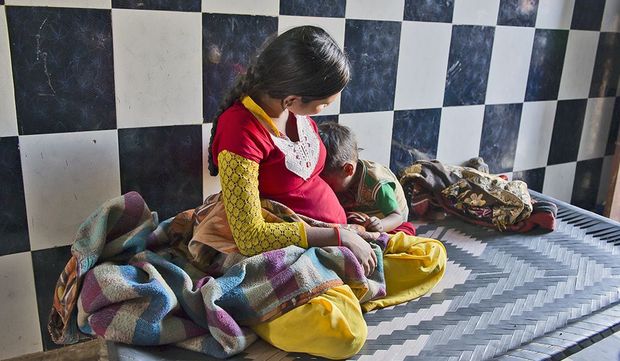
Fifteen-year-old Abhilasha is 18 weeks pregnant with triplets. Her doctor, Delhi-based gynaecologist Dr Archana Dhawan Bajaj, is in a quandary. Though it is legal to abort a foetus until 20 weeks, in Abhilasha's case it would be risky as she is carrying three foetuses. “Well, the pregnancy is also going to be risky,” says Bajaj. “She is too young. Her bones and organs are not fully developed. I am not sure what to do.” On an average, gynaecologists in India deal with four to five pregnant teens each month. “Young girls come to my OPD when there is a delay in their menstrual cycle,” says Dr Ranjana Sharma, senior consultant gynaecologist, Indraprastha Apollo Hospitals, Delhi. “I have worked in many countries in the west. There, it was mostly poor and uneducated teens who came to me with pregnancies, while in India, the girls are from educated and well-to-do families. Most times, they come with their partners, asking for an abortion. It is a tricky situation, but I have no choice but to provide the service in confidentiality. Otherwise, she might go to an unauthorised centre, which could be riskier for her.”
Doctors say the key reason for teenage pregnancies and consequent abortions is the lack of knowledge about contraception. Statistics show that teenage pregnancy is higher in India when compared with other countries. According to a 2013 United Nations Population Fund report, there were 62 pregnant teens per 1,000 women in India, while figures for the UK and the US were 24 and 42, respectively. Teenage pregnancy is also responsible for a higher infant mortality rate, as adolescent mothers are less likely to obtain skilled care before, during, and after childbirth. Besides, teenage pregnancy and childbirth also adversely impact the economy. The lifetime cost of adolescent pregnancy is calculated to be around 12 per cent of India's GDP. It is estimated that if girls delayed pregnancy until their early twenties, India’s productivity would be $7.7 billion higher.
To tackle the issue, there needs to be a considerable shift in attitudes towards teenagers and sex. There is a lack of openness in discussing sex. “It is taboo to say the word at home,” says Dr Tripat Choudhary, Fortis Hospital, Delhi. “As a result, youngsters search for the word on the internet and get wrong, tantalising information. They experiment with sex and get into trouble. Once, a 15-year-old pregnant girl came to see me. Her partner was waiting outside my cabin. The young boy was traumatised. I convinced both of them to call their parents. They both required support and counselling. In case of pregnancy, often, we blame the boy and treat the girl as a victim. But in some cases, both the boy and the girl are too young to understand the consequences. I counsel the girls as well as the boys.”
Sharma agrees: “As a doctor, I can’t really convince them not to indulge in pre-marital sex, but knowledge about safe sex can prevent pregnancy and other associated health problems. Contraception is a must. Lack of knowledge means that these youngsters often rely on television commercials. No wonder then that in the past few years, the emergency pill has become a favoured contraceptive. Most of my young patients tell me that they use these pills as their primary form of contraception, taking up to five pills in three months. The strong hormone in these pills, which are meant to be used only once in a while, or in case of failure of the primary contraceptive, plays havoc with their hormonal cycles. In fact, many girls come to me with irregular menstrual cycles, an indicator of their sexual activity.” Says Bajaj: “A young girl, around 18 years of age, came to meet me complaining of excessive bleeding during her periods. Her breasts were filled with small cysts. When I couldn’t figure out the cause, I asked if she had a partner. Her face reddened with fear as her mother was accompanying her. She later told me that she was taking an emergency pill almost thrice a month as she felt it was the easiest and safest method of contraception.” Pregnancy is not the only problem associated with sexual activity at a young age. Sexually transmitted diseases and cervical cancer are other risks. “These risks multiply with multiple partners,” says Dr Alka Sinha, senior gynaecologist, BLK Hospital, Delhi. “And now, with sexual activity becoming common at an early age, it is normal for youngsters to have more than one partner.” Besides, in their desire to keep their pregnancy a secret, teens sometimes carry out self-abortions, information on which is easily available on the internet. Self-abortions, in the absence of medical supervision, can lead to permanent damage of the reproductive organs. “In any case, abortions at a young age are loaded with long-term implications,” says Bajaj. “I get so many cases of infertility, where patients reveal to me that they had undergone abortions during their teenage years.”
 No child's play: A young pregnant mother in Dharampura village, where girls usually get married at age 14 or 15 | Sanjay Ahlawat
No child's play: A young pregnant mother in Dharampura village, where girls usually get married at age 14 or 15 | Sanjay Ahlawat
Studies show that knowledge about sex and contraception deter teenagers from indulging in sexual activity. “In India, we don’t address these issues at home or at school,” says child psychiatrist Dr Jitendra Nagpal. “Ideally, children should be sensitised about their bodies and reproductive health gradually, from a young age, to avoid teenage pregnancies. I believe that education is the best contraceptive.” Unfortunately, however, even the government’s family welfare programmes do not address the need for contraception in unmarried youth. “The problem is that many of these young girls and boys are denied access to contraception,” says Sinha. “Even a chemist looks at them with suspicion.” Doctors feel that it is imperative to involve parents in cases of teenage pregnancy. In cases where girls were accompanied by their mothers rather than their partners, they behaved more responsibly and chances of a second pregnancy reduced manifold. Nagpal says that parents need to understand that teenage pregnancy affects more than just the sexual health of a girl. As anaemia is widespread among urban girls, pregnancy or blood loss during teenage years may affect brain function. Access to pornography, which portrays a distorted image of sex, also adversely affects a teen's delicate psychology. The solution, thus, lies in sex education and in creating a healthy, open dialogue on the topic between adolescents and their parents and teachers.
Some names have been changed.
ABORTING THE CAUSES
Tabu says she is 21 years old, but the community health worker in her village, Dharampura, on the outskirts of Delhi, says she is no more than 19. Tabu is a mother of a three-year-old boy and is expecting her second child.
Shobha, 20, lives two houses away. She is married and is six months pregnant. She has had two miscarriages in the past seven years. Her doctor told her that it was her physical weakness that led to the miscarriages. Her elder sister Sudha, 21, has a seven-year-old son.
Ask them their age and they simply say a number above 18. “Here, girls get married very early, at 14 or 15,” says Mamta Kumari, a field worker with Apne Aap Women Worldwide, an NGO that deals with women's health. “At the time of marriage, the boy’s parents give dowry to the girl's parents, the amount dependent on the beauty of the girl. After she bears her first child, the girl is pushed into prostitution.”
In the Sapera community that lives in Dharampura, too, though there is no prostitution, early marriage is a tradition. Kajal, 18, is expecting her second child. She has never gone to school but says she will send her children to school.
Underage marriage is the fundamental cause of teenage pregnancy. “In Bihar, girls as young as 12 or 13 years get married and bear their first child before they turn 14 or 15,” says Tinku Khanna, who also works with Apne Aap, assisting teenaged mothers in Bihar. “This leads to a higher rate of maternal mortality. These girls, or rather children, have negligible access to education and health facilities. Many of them are also pushed into prostitution.”
According to a 2011 UNICEF report, only 11 people in India were convicted of perpetuating child marriage in 2010. “As far as teenage pregnancy is concerned, the situation in India is grim,” says Alka Barua, who works in the adolescent health and development department of the World Health Organisation. “Though we have many policies in place, we never implement them at the grassroots level. The prevalence is particularly high among the uneducated population.” Compounding the problem is a severe shortage of health care facilities available to women, particularly, young, unwed mothers. “Though every woman has a right to safe abortion under the 1971 Medical Termination of Pregnancy Act, it is not available to these women,” says Dr Shilpa Desai Shroff, who works with the NGO Asia Safe Abortion Partnership. “As a result, a few years ago, women started using abortion pills at an advanced stage of pregnancy, unaware of the implications. What did the government do then? Instead of spreading awareness about them, they almost banned these pills in Maharashtra and Gujarat. Medical abortion using pills at an early stage of pregnancy is a preferred method as it has fewer side effects compared with surgical methods.”
Ineffective or counter-productive government policies need to be revised to tackle teenage pregnancy. “Under the government programme, we must approach the girls after they become pregnant,” says K.J. Santhya, who works with the NGO Population Council. “We are not addressing the need to educate teenagers about safe sex and contraception. What is the point in addressing the issue after the damage is already done?” The only solution, says Khanna, is awareness and education.





